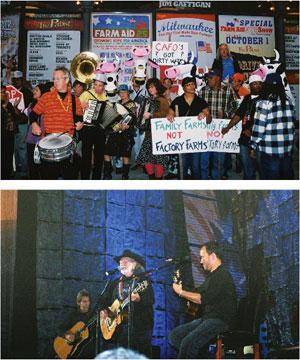Farm Aid 2010

Farm Aid's 25th anniversary concert was held on Oct. 2 in Milwaukee, Wis. It was a celebration of music and of the devotion of the organization to family farmers. However, behind the great music and energy lies sadness that their work to end our long-term farm crisis must continue.
Many people know about the organization and are familiar with some of its board of directors—Willie Nelson, Neil Young, John Mellencamp and Dave Matthews. But too few know of the work that they do besides performing at the concert itself.
I was doing some research on their website and came across the following question someone had sent in: "No offense, but what has Farm Aid really done all these years aside from put on a good concert?"
The answer is, it has done a lot. Farm Aid began in 1985 in response to the U.S. farm crisis. Plummeting crop prices and land values, rising interest rates, troubled credit markets and unfair lending practices pushed tens of thousands of farms out of business, forcing nearly 1 million people off their land in a single 12-month period. This massive loss of family farms closed down many small businesses—banks, feed and supply stores, farm equipment stores.
At that time Nelson, Mellencamp and Young organized the first concert, held on Sept. 22, 1985, in Champaign, Ill. They figured federal policy makers would feel the pressure to craft a solution, and the concert was intended to be a one-time event. Despite the $9 million and awareness raised then, the problems did not go away. Each year since, a concert has been held, and Farm Aid's board of directors continues to feel the same need to carry on its work.
Farm Aid distributes money raised to organizations around the country that provide emergency grants to farm families, offer crisis prevention services, and work to address farm policy at state and federal levels. Over the years, many people have been helped, directly and indirectly. Working with partners—the National Family Farm Coalition (NFFC), the Western Organization of Resource Councils (WORC) and the Farmers Legal Action Group (FLAG)—they helped get the Agricultural Credit Act of 1987 passed, a law that has saved tens of thousands of family farms from foreclosure. Nelson and Farm Aid staff sent letters to 90,000 U.S. farmers, informing them about their rights under the new law.
Partner organizations also act as fiscal agents to distribute funds directly to farmers in crisis who have asked for help. I have worked with a number of these groups and have had the opportunity to see this assistance in action. When floods hit the Midwest two years ago, much cropland was lost and many families were displaced from their homes. Farm Aid funds were used to help farm families with medical expenses, food, utilities and necessities.
The work is both fulfilling and heartbreaking. It is not uncommon for a farmer to have financial problems. They are often paid too little for their crops. If they cannot obtain more than production costs, they have to go deeper into debt. This, all too frequently, results in their inability to pay debts and the loss of the farm—land that may have been in the family for generations. Partnering organizations get calls from farmers who are suicidal, not knowing where to turn when they face losing everything they have.
Farm Aid's goal is to ensure that this crisis ends, that family farmers can make a decent living, stay on their land and continue to provide us with quality food produced here. Twenty-five concerts have not fixed the farm crisis, but Farm Aid insists that they will be here for another 25 years if needed. As Neil Young stated, "You can never give up—never, never, never."
More information on Farm Aid, including the ability to watch the concert and to donate to the cause, is available on its website: www.farmaid.org.







